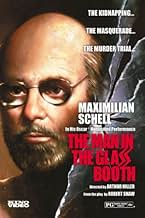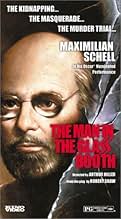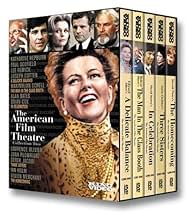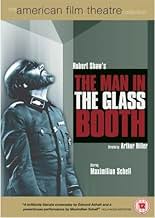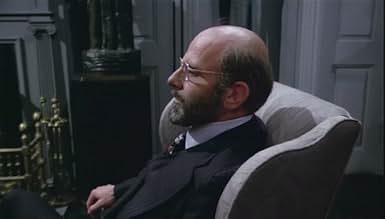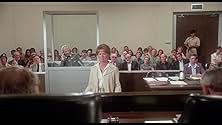NOTE IMDb
7,0/10
1,7 k
MA NOTE
Ajouter une intrigue dans votre langueMossad agents kidnap an American Jewish man, accuse him of being a fugitive Nazi war criminal and take him to Jerusalem to face trial for genocide.Mossad agents kidnap an American Jewish man, accuse him of being a fugitive Nazi war criminal and take him to Jerusalem to face trial for genocide.Mossad agents kidnap an American Jewish man, accuse him of being a fugitive Nazi war criminal and take him to Jerusalem to face trial for genocide.
- Réalisation
- Scénario
- Casting principal
- Nommé pour 1 Oscar
- 3 nominations au total
Leonidas Ossetynski
- Samuel Weinberg
- (as Leonidas Ossettynski)
Avis à la une
I have viewed this movie many times in a poor quality VHS and now finally on DVD. It's difficult to explain the impact this movie can have and one viewing will not do it. It takes several viewings to really get the plot line. Millionaire Jewish entrepreneur Arthur Goldman rules his financial empire from a penthouse apartment overlooking Manhattan. Seemingly at the edge of sanity, Goldman holds forth on everyting from Papal edicts to ex-wives, from baseball to his family's massacre in a Nazi concentration camp. When Goldman remarks on a blue Mercedes continuously parked outside his building, Goldman's captive audience of assistant and chauffeur dismiss their boss' anxiety as encroaching paranoia. But each of Goldman's passionate, seemingly capricious ravings are transformed into a shocking, inadvertent deposition when Israeli agents capture Goldman and put him on trial as Adolph Dorf, the commandant of the concentration camp where Goldman's family was supposedly exterminated. In a trial scene of unrelenting intensity, crafts what the Detroit Free Press called "a white-hot lead performance," mutating from eccentric Goldman to sociopath Dorf and beyond. The riddle of Dorf's true identity becomes wrapped in an enigma of cunning self-treachery and single-minded obsession.
The late Austrian actor Maximilian Schell first came to prominence in Hollywood in a supporting role as Nazi Marlon Brando's superior officer in the WWII epic THE YOUNG LIONS (1958); eventually, he became an international film star upon winning the Best Actor Oscar for Stanley Kramer's star-studded indictment of Nazi war crimes, JUDGMENT AT NUREMBERG (1961) which, despite the sheer brilliance of his performance, was a somewhat surprising accolade given that he was competing against Paul Newman's iconic characterization of Fast Eddie Felson in THE HUSTLER! Interestingly enough, two of Schell's future Oscar nominations also dealt with Nazism, namely THE PEDESTRIAN (1973; which Schell also directed) and the film under review which garnered him his second Best Actor nod. Once again, he came against an iconic performance – Jack Nicholson's Randle P. McMurphy in ONE FLEW OVER THE CUCKOO'S NEST – but lost out to it this time around; for the record, I have just came across the obscure GIVE'EM HELL HARRY which was the only Best Actor (James Whitmore) nominee from that same year which was still eluding me...
THE MAN IN THE GLASS BOOTH is the fourth of 14 productions from The American Film Theater that I have watched – following Lindsay Anderson's IN CELEBRATION (1975), Guy Green's LUTHER (1974) and Joseph Losey's GALILEO (1975) which more than anything sought to record and preserve renowned pieces of theatre that often featured notable actors. In this case, Arthur Hiller transposes Robert Shaw's play about a Jewish industrialist afflicted by the delusion of being a notorious Nazi officer; this controversial ruse undeniably elicits comparisons with THE RULING CLASS (1971) where Peter O'Toole's mad aristocrat first thinks he is Jesus Christ but then morphs into Jack The Ripper by the end of the film! Curiously enough, Shaw initially objected to Edward Anhalt's s adaptation of his material and asked to have his name removed from the film's opening credits; after watching it, however, he relented and agreed to put it back on but by then it was too late and, indeed, his name does not appear anywhere in the film's opening credits, In any case, there seems to have been no animosity between the two multi-talented actors as Schell eventually directed Shaw in END OF THE GAME (1975) and they co-starred in Shaw's untimely swan song AVALANCHE EXPRESS (1979).
Given the film's title, source of origin and subject matter, I was under the impression that the film would be entirely taken up by the trial which, when it actually comes on in the second half Is indeed riveting – with concentration camp survivors brought face to face with their tormentor; members of the aggrieved public rising from their seats to beat him up following his latest animated diatribe; Schell's own doctors 'confirming' his identity until one of them (Leonard Cimino) breaks down and admits that the evidence was planted by Schell himself! In this part of the film, the presence of passionate prosecutor Lois Nettleton and sensible Magistrate Luther Adler also makes itself felt. While the film's central conceit – a wealthy Jew exposed publicly as a notorious Nazi but ultimately emerging as a delusional Jew - is a fascinating one, it is quite contrived; in fact, the surprisingly fanciful first half, set atop paranoid Schell's NYC apartment, is somewhat heavy-going and even hard-to-take at times. That the film ends up being a worthy one regardless is mostly due to bald-headed, bearded and bespectacled Schell's tour-de-force performance; interestingly, despite the actor's Germanic heritage, he would again impersonate Jews in THE DIARY OF ANNE FRANK (1980; TV) and THE CHOSEN (1981). For the record, the copy I acquired suffers from lip-sync issues that can prove distracting at first but one grows accustomed to that fault before long.
THE MAN IN THE GLASS BOOTH is the fourth of 14 productions from The American Film Theater that I have watched – following Lindsay Anderson's IN CELEBRATION (1975), Guy Green's LUTHER (1974) and Joseph Losey's GALILEO (1975) which more than anything sought to record and preserve renowned pieces of theatre that often featured notable actors. In this case, Arthur Hiller transposes Robert Shaw's play about a Jewish industrialist afflicted by the delusion of being a notorious Nazi officer; this controversial ruse undeniably elicits comparisons with THE RULING CLASS (1971) where Peter O'Toole's mad aristocrat first thinks he is Jesus Christ but then morphs into Jack The Ripper by the end of the film! Curiously enough, Shaw initially objected to Edward Anhalt's s adaptation of his material and asked to have his name removed from the film's opening credits; after watching it, however, he relented and agreed to put it back on but by then it was too late and, indeed, his name does not appear anywhere in the film's opening credits, In any case, there seems to have been no animosity between the two multi-talented actors as Schell eventually directed Shaw in END OF THE GAME (1975) and they co-starred in Shaw's untimely swan song AVALANCHE EXPRESS (1979).
Given the film's title, source of origin and subject matter, I was under the impression that the film would be entirely taken up by the trial which, when it actually comes on in the second half Is indeed riveting – with concentration camp survivors brought face to face with their tormentor; members of the aggrieved public rising from their seats to beat him up following his latest animated diatribe; Schell's own doctors 'confirming' his identity until one of them (Leonard Cimino) breaks down and admits that the evidence was planted by Schell himself! In this part of the film, the presence of passionate prosecutor Lois Nettleton and sensible Magistrate Luther Adler also makes itself felt. While the film's central conceit – a wealthy Jew exposed publicly as a notorious Nazi but ultimately emerging as a delusional Jew - is a fascinating one, it is quite contrived; in fact, the surprisingly fanciful first half, set atop paranoid Schell's NYC apartment, is somewhat heavy-going and even hard-to-take at times. That the film ends up being a worthy one regardless is mostly due to bald-headed, bearded and bespectacled Schell's tour-de-force performance; interestingly, despite the actor's Germanic heritage, he would again impersonate Jews in THE DIARY OF ANNE FRANK (1980; TV) and THE CHOSEN (1981). For the record, the copy I acquired suffers from lip-sync issues that can prove distracting at first but one grows accustomed to that fault before long.
Nice film with magnificent performances about a successful Jew who is kidnapped by Mosad to respond his crimes .It deals with a wealthy Jewish businessman is suspected of being a Nazi war criminal.
This is a retelling of a novel written by actor Robert Shaw, from whose credits he requested his name be removed, and it was adapted as a play by prestigious playwright Harold Pinter who also carried it to stage at a Broadway theater. It works up a certain weight in its exploration of interesting issues as wrong accusation, guilt, responsability and forgiveness .This one belongs to American Film Theater in which it tries to embalm theatrical interpretations. Being freely based on the life of Otto Adolf Eichmann, the picture depicts the arrest and subsequent trial of the former Nazi by the Israelies accused of being a former Nazi concentration commandant. The film's title is derived from the fact that Eichmann sat in glass booth during his trial. And his character has been also adapted in The trial of Adolf Eichman 1997, Eichmann 2007 by Robert Young with Thomas Kretschmann, Franca Potente, Stephen Fry and Hanna Arendt 2012 by Margarette Van Trotta with Barbara Sukowa, Julia Jentsch, Jane McTeer. Cast and support cast provide terrific acting, but it still emerges as stagily verbose. Starring Maximiliam Schell gives a fabulous performance, he delivers a self-indulgent playing, though overacting, at times. He is welll accompanied by a pretty support cast as Louis Nettleton as a prosecutor, Luther Adler as a Judge, Leonard Cimino as a witness, Henry Brown, Lawrence Pressman, among others.
The motion picture with adequate cinematography by Sam Leavitt, being professionally directed by Arthur Hiller. He was a good professional with long career and life, as he died at 93. Hiller directed all kinds of genres with penchant for dramas and comedies. Including important films with the greatest actors, such as : The Americanization of Emily, The miracle of the white stallions, Promise her anything, Plaza suite, Man of La Mancha, The in-laws, Making Love, Tobruk, Silver streak, Nightwing, Author author, Teachers, Outrageous fortune, The lonely guy, See no evil hear no evil, Taking care of business, The babe, among others .Rating 7/10 .Well worth watching. Better than average
This is a retelling of a novel written by actor Robert Shaw, from whose credits he requested his name be removed, and it was adapted as a play by prestigious playwright Harold Pinter who also carried it to stage at a Broadway theater. It works up a certain weight in its exploration of interesting issues as wrong accusation, guilt, responsability and forgiveness .This one belongs to American Film Theater in which it tries to embalm theatrical interpretations. Being freely based on the life of Otto Adolf Eichmann, the picture depicts the arrest and subsequent trial of the former Nazi by the Israelies accused of being a former Nazi concentration commandant. The film's title is derived from the fact that Eichmann sat in glass booth during his trial. And his character has been also adapted in The trial of Adolf Eichman 1997, Eichmann 2007 by Robert Young with Thomas Kretschmann, Franca Potente, Stephen Fry and Hanna Arendt 2012 by Margarette Van Trotta with Barbara Sukowa, Julia Jentsch, Jane McTeer. Cast and support cast provide terrific acting, but it still emerges as stagily verbose. Starring Maximiliam Schell gives a fabulous performance, he delivers a self-indulgent playing, though overacting, at times. He is welll accompanied by a pretty support cast as Louis Nettleton as a prosecutor, Luther Adler as a Judge, Leonard Cimino as a witness, Henry Brown, Lawrence Pressman, among others.
The motion picture with adequate cinematography by Sam Leavitt, being professionally directed by Arthur Hiller. He was a good professional with long career and life, as he died at 93. Hiller directed all kinds of genres with penchant for dramas and comedies. Including important films with the greatest actors, such as : The Americanization of Emily, The miracle of the white stallions, Promise her anything, Plaza suite, Man of La Mancha, The in-laws, Making Love, Tobruk, Silver streak, Nightwing, Author author, Teachers, Outrageous fortune, The lonely guy, See no evil hear no evil, Taking care of business, The babe, among others .Rating 7/10 .Well worth watching. Better than average
Although I have not seen this film for years it sticks in my mind as one of the best, particularly for its type, ie a courtroom dram, with few different scenes, (the other similar movie I liked was Twelve Angry Men.
The acting is superb, particularly Max Schell as the Nazi and the twists keep the viewer alert.
It is the type of movie that should be shown on TV much more often. It does have a message as well.
The acting is superb, particularly Max Schell as the Nazi and the twists keep the viewer alert.
It is the type of movie that should be shown on TV much more often. It does have a message as well.
7sol-
A fairly fascinating film, with a thought-provoking, albeit rather contrived, twist at the end, the material is helped a great deal by Maximilian Schell's Oscar nominated performance as the title person. Schell is startlingly good, considering what he has to do, balancing out two different eccentric personalities that are part of his one character. The character he plays is the most intriguing element throughout, but it does have a tendency to dominate, and therefore overshadow the things that film has to say. It also takes a while to get where its going, however the second half is highly intense stuff, and the film is merited by interesting ideas the whole time through.
Le saviez-vous
- AnecdotesThis film was part of the American Film Theatre series, an experiment in marketing films (all based on plays) that would not otherwise have been able to get financing. Instead of being released to the general public, only people who purchased a subscription to the American Film Theatre series could buy tickets to any of its films. (Exceptions were made for movie critics and members of award-granting organizations, such as the American Academy of Motion Picture Arts and Sciences which awards the Oscars.) As a result, only a small number of people ever saw any of the films in their theatre runs. To enhance the value of the subscriptions, subscribers were guaranteed that the films would never be shown on television and never released to the general public. Legal issues connected with these guarantees kept this film from being available in any form for nearly 3 decades. It was finally released on DVD in 2003. The American Film Theatre experiment was abandoned after 2 years.
- GaffesThe Nazi Concentration Camps were run by the SS. The Wehrmacht (the regular German Army, also referred to as the Heer) was not directly involved in running the camps. Also The SS used it's own rank titles, so Dorf would have been known as a Standartenfuhrer instead of an Oberst (Colonel).
- Citations
Arthur Goldman: Passion play is a passion play.
- ConnexionsFeatured in Sunset Over Mulholland Drive (2019)
- Bandes originalesEs war ein Edelweiss
(uncredited)
Written by Herms Niel
Sung by Lawrence Pressman and Maximilian Schell
Meilleurs choix
Connectez-vous pour évaluer et suivre la liste de favoris afin de recevoir des recommandations personnalisées
- How long is The Man in the Glass Booth?Alimenté par Alexa
Détails
- Date de sortie
- Pays d’origine
- Langues
- Aussi connu sous le nom de
- El hombre de la cabina de cristal
- Lieux de tournage
- Sociétés de production
- Voir plus de crédits d'entreprise sur IMDbPro
Box-office
- Budget
- 1 000 000 $US (estimé)
- Durée1 heure 57 minutes
- Mixage
- Rapport de forme
- 1.85 : 1
Contribuer à cette page
Suggérer une modification ou ajouter du contenu manquant

